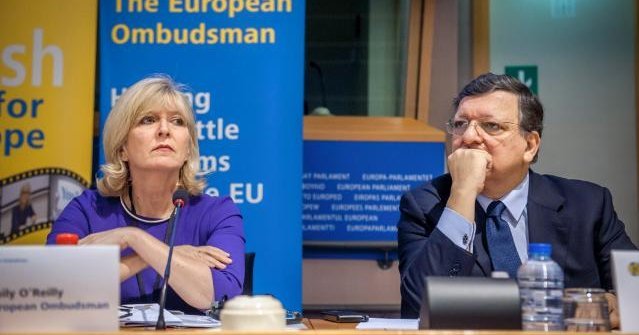“Revolving doors” and conflicts of interest: what is at stake?
“Unethical”, “morally reprehensible”, “dishonest”, “dishonour”, “irresponsible”, “sold out”, “gold-plated revolving door”, “V-sign to Europe”… Insults and indignation poured out following the news that José Manuel Barroso was hired by Goldman Sachs. Yet, Barroso is not a European official anymore, and has legally the right to work in the private sector. So why did his appointment provoke such a public outcry?
The situation in which a high-ranking official is leaving public service to work in the private sector is called “revolving doors”, and this phenomenon is a critical issue. Indeed, ethical and deontological problems are likely to emerge if these situations create conflicts of interests. To give an example, a situation in which a senior official who would have worked in a Ministry of Health and who would then work as a lobbyist for a tobacco industry would pose a serious ethical problem. Why? Because as a health official, you are led to work on health-related legislation, for example limiting tobacco consumption in public spaces, prohibiting certain substances in cigarettes, or raising awareness campaigns on the link between cancer and smoking. If you work as a lobbyist for a tobacco company afterwards, you will be led to try to influence the policy-makers to soften this kind of legislation, to counter these awareness campaigns, and to deliver a speech contesting the consequences of tobacco consumption on health. In short, you will move from defending public interest and protecting public health to defending and favouring private interests.
These situations are more and more criticised, and not only by the public opinion or by the civil society. Emily O’Reilly, the European Ombudsman, has publicly criticised this phenomenon several times, and even launched several inquiries into revolving doors, including one focusing on the case of Barroso at the beginning of 2017.
Yet, Barroso did not break the Code of Conduct for Members of the European Commission, which sets up a “cooling-off” period of 18 months (at the time), from the end of the mandate of European commissioners, during which they have to inform the European Commission to have the right to join a private company. Barroso did not break this rule, as he joined Goldman Sachs more than 18 months after he left the Commission. So where is the problem?
Legal is not always moral: the “Barroso case”
The first problem rests on the pollical context. Barroso was hired while Goldman Sachs, based in London, is preparing for the consequences of Brexit (the result of the referendum was known on 24 June 2016, Barroso was hired two weeks later). The activity of the investment bank depends a lot on the “passporting rights” delivered to the banks based in the EU, allowing them to sell their services freely across the EU, and give firms based in Europe unfettered access to the UK. Brexit and leaving the EU’s single market thus threatens Goldman Sachs, which, as such, announced considering moving half of its London-based jobs to Frankfurt.
Barroso was openly hired as ’non-executive chairman of international operations and adviser’, for his large number of contacts and his intimate knowledge of the complex European machinery, and to help the company “limit the negative effects of the Brexit”. Barroso declared himself: Of course I know well the EU, I also know relatively well the UK environment. If my advice can be helpful in this circumstance I am ready to contribute." He also acknowledged that passporting rights would be one of the most sensitive issues in the Brexit negotiations between the EU and the UK.
Second problem: Barroso was President of the Commission when the institution had to deal with the financial crisis, and he was hired by one the banks that was the most implicated in the Greek crisis. Goldman Sachs had helped the Greek state to hide its deficit to stay in the Eurozone, and then gambled against the Greek debt while perfectly knowing its unsustainability. The former President of one EU institution, supposed to represent the EU values, among which solidarity and integrity, thus does not seem to see any ethical issue in working for a banking institution which contributed to harm one of its member states and by extension the economic and monetary union.
Third problem, the Barroso case has weakened the public image and integrity of the EU. Such an appointment is very prejudicial to the EU institutions and contributes to worsen the crisis of confidence of the European citizens. This is a disastrous symbol for the EU that a former President of the Commission, the former President of the European executive, becomes linked to an unethical and unbridled financial world embodied by Goldman Sachs. It is also a godsend for Europhobic parties. After Barroso’s appointment was announced, Marine Le Pen hastened to tweet: “Barroso at Goldman Sachs: nothing surprising when one knows that the EU does not serve the peoples but big finance”. Likewise, Nigel Farage ironically tweeted: “Congratulations to former EU Commission President Barroso, now over at Goldman Sachs. Global corporatism!”
This kind of scandal and such reactions are likely to lead to a general negative perception of the European institutions, to bring discredit on the EU, and to weaken the integrity of the European Union as a whole. But apparently, the former president of its executive organ did not seem very much concerned about it.
An immediate reaction from the Union…
The Union quickly reacted following the news, starting with the European Ombudsman Emily O’Reilly, who publicly expressed her disapproval and sent a letter to Jean-Claude Juncker, the current President of the Commission, warning him on the ethical preoccupations provoked by the appointment of Barroso. Mr Juncker answered, officially asked Barroso to explain himself, and opened an inquiry on the appointment of his predecessor.
An ad-hoc ethical committee of the European Commission was asked to check the conformity of Barroso’s new functions regarding European legislation, the end of the 18 months cooling-off period not being the only criteria to take into consideration. Indeed, according to the Code of Conduct, as well to article 245 TFEU, former Members of the Commission have to behave with “integrity and discretion”. The appointment of Barroso may appear contrary to these principles of a European public service supposed to defend the European general interest. A collective composed of EU staff members even launched a petition in this sense, called “For strong exemplary measures to be taken against JM Barroso for joining Goldman Sachs”, which collected 154,036 signatures and accuses Barroso of having dishonoured the EU public service and the European Union as a whole.
What would be the concrete consequences for Barroso? He would not be received in the Commission as one of its former Presidents, but as a simple lobbyist. Moreover, the former commissioners who do not behave with integrity in their new functions can be deprived from their pension allowance. To regain credibility after this scandal, the Union would be well advised to sanction Barroso. This would send a strong message to the citizens: the Union do not tolerate such obvious cases of revolving doors and conflict of interests, and opposes a multinational finance company involved in the subprime crisis.
… followed by disappointing developments
If the reactions of the Ombudsman and of the EU staff have been remarkable, they were unfortunately not followed by strong measures. To begin with, the ad-hoc ethical committee concluded that Barroso did not break any rule by taking up a job at Goldman Sachs, pointing out that the 18 months cooling-off period had been respected, and that “there are not sufficient grounds to establish a violation of the duty of integrity and discretion”. The committee only tepidly acknowledged that Barroso had “not shown the considerate judgement one may expect from someone having held the high office he occupied for so many years”. One cannot call it neither a sanction nor a strong message or warning.
Nevertheless, a revision of the Code of Conduct for Members of the European Commission entered into force on 31 January 2018, supposedly “strengthening ethical rules”. For example, the “cooling-off” period of 18 months was extended to two years for former Commissioners and to three years for the President of the Commission. This, in my opinion, does not strengthen anything, it only delays possible conflicts of interest. No matter if Barroso had taken office at Goldman Sachs after 18 months or three years: regarding the situation and its previous functions, it is still shocking. Likewise, the definition of what is a “conflict of interest” in the Code of Conduct and the need to consult an ethical committee add nothing but writing practices that already existed, and which, we saw it, did not bring any improvement, exemplary measure or sanction.
Finally, the latest development is a controversial meeting in Brussels between Barroso and Jyrki Katainen, the European Commission Vice-President for Jobs, Growth, Investment and Competitiveness. This meeting was revealed by Alter-EU, the Alliance for Lobbying Transparency and Ethics Regulation, which suspects this meeting to be an activity of lobbying, whereas Barroso had affirmed Juncker that he would not lobby on behalf of Goldman Sachs. Alter-EU’s suspicions are shared by Emily O’Reilly, who demanded that the ethical committee reassessed Barroso’s case. Unfortunately, if the European Ombudsman’s attitude appears exemplary and restores the image of the European Union, her request was rejected by the Commission.
Therefore, as the Commission appears inefficient (and perhaps indifferent) to a real improvement of the fight against conflict of interests in the European Union, could the European Parliament (in particular its Legal Affairs Committee) be the institution to take the plunge? After all, the Parliament had already asked the Commission to revise its Code of Conduct, and may appear more receptive to the Ombudsman’s requests and expertise.


Follow the comments: |
|
